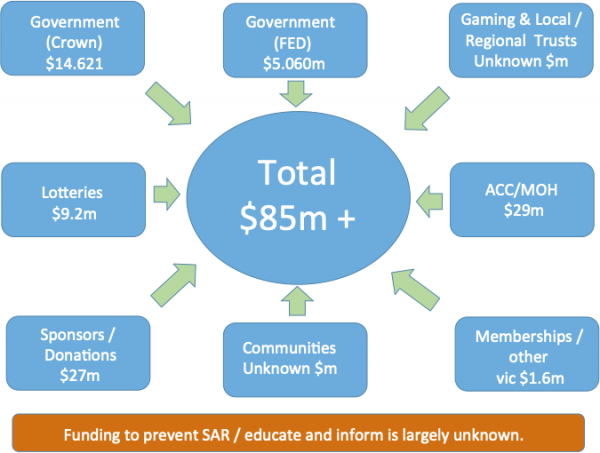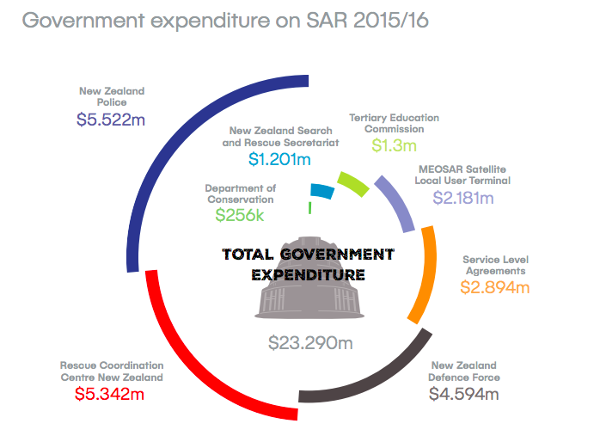Funding
Page updated: 30 December 2020
The funding arrangements for the SAR sector have evolved organically, rather then being planned and centralised.
This is creating some sustainability risks for the sector, which are discussed below.
NZSAR Funding is Highly Fragmented
It is currently very difficult to obtain a comprehensive and clear picture of the funding available to the search and rescue sector. This is because it originates form multiple sources and is received by a wide range of organisations with varying degrees of clarity.
The devolved SAR sector model means that funding for the service is highly fragmented across multiple Votes. NZ Police, the NZ Defence Force and Maritime NZ all seek funding for SAR, with a hypothecated fuel excise levy paying for other coordination and administrative functions.
A surprisingly high amount of the sector’s funding also comes from volunteer organisations that seek funding through other channels (e.g. BP sponsors surf lifesaving, the Coastguard runs its own raffles / lottery[i] and other lotteries grants are also accessed by the sector). In a recent survey, most people said they were aware that central government doesn’t cover all SAR costs. But it is “fair to say most respondents assumed that central government pays more than it actually does”. Many people also stated that they expected ACC to cover injury costs and possibly SAR operational costs.
The complexity of the funding picture is illustrated below.

For example, only around a third of the SAR sector’s funding is received through government appropriation and even this funding from government is not managed as a single coherent package. Government funding for SAR activity is appropriated through a range of different mechanisms as set out in the figure[i]

Funding fragmentation can make it hard to plan ahead
Because it comes from so many contingent sources, SAR sector funding can be unreliable, or even volatile. This can make planning for the future challenging.
For example, the NZSAR risk matrix comments that funding levels for SAR agencies can be volatile due to profit variances with key gaming or lotteries trusts & boards. Grants policies also frequently change which can affect eligibility. Public appeals & donations are susceptible to change. The NZSAR Secretariat itself notes that volatile funding inhibits long term planning and investment. It also degrades sector effectiveness and efficiency.
Furthermore, sometimes the funding is put to actual SAR activities, but anecdotal evidence suggests that sometimes it may be diverted to other uses by different organisations.
This disaggregated funding model appears not to be challenged at present. However, it could come under scrutiny in future if, for example:
- the SAR service were considered to be significantly and persistently under-funded increasing the risk of poor outcomes;
- SAR staff and volunteers did not have sufficient training to save lives;
- SAR organisations’ kit was severely out of date, compromising major operations; and/or
- population concentration, and associated ‘hollowing out’ of regions led a large number of operational units (e.g. LandSAR units) to shut down. It can be a battle for some of these units to recruit and retain people already.
---
[i] “Coastguard Lottery Results.” National, www.coastguard.nz/get-involved/other-ways-to-help/buy-a-lottery-ticket/results/.
Funding is not linked to demand currently
At present, there is no demand model underpinning the funding arrangements of the SAR sector. Could this create a challenge for sustainable SAR delivery in future?
The lack of a demand-linked funding model has not been a significant problem to date given that demand has remained reasonably static over a long period of time.
Where the tension can be detected is the need for a lot of negotiation across different parts of government to access limited assets. For example, Customs, Fisheries and Search and Rescue agencies must all frequently share access to surveillance assets in order to fulfil their roles. This requires excellent relationships and ability to negotiate between competing pressures. Arguably the sustainability of the SAR sector should not be so reliant on personalities and relationships.
Further if demand does rise in future as a result of the environmental trends described above, the lack of a demand-linked model could mean the sustainability of the funding model comes into question.
SAR services remain free at point of consumption too
There is broad-based public and political acceptance that search and rescue should continue to be provided free at the point of consumption.
In a survey of SAR’s operations, all respondents expected a SAR operation to be free to them, though a number said that they did not expect them to be free to international tourists.[i]
The minor exception to this is research that has identified a small number of people expressed that they don’t think SAR should be free to those who have exhibited risky or ‘stupid’ behaviour in the New Zealand wilderness.
Other countries, like France, have a ‘fee-for-service’ or other charging model for SAR services.
There are a number of ways that SAR services could do this. For example, these include exploring funding options through ACC, marine salvage fees and charging people for service.
In practice, it would be difficult to actually introduce fees at the point of consumption because it would conflict with public expectations and it could create perverse incentives on those who might otherwise benefit from being rescued.
Furthermore, complications could arise with existing international obligations such as the International Convention for the Safety of Life at Sea.
---
[i] NZSAR. “Public Expectations and Perceptions Of Search and Rescue in New Zealand.” NZSAR, May 2016, nzsar.govt.nz/Portals/4/Publications/Research/SAR%20Expectations%20Research%20Report.pdf.
Longer term, the funding model may not be sustainable
Funding fragmentation may be hiding the true costs of the SAR service and does not support transparency about spending. Some people have argued that in future SAR funding should be coordinated centrally.
When asked whether the funding model was fit for the future challenges and opportunities ahead, one person interviewed for this environmental scan commented:
“No, the government funding for SAR should be coordinated in a single SAR Vote. Many of the real costs are hidden at the moment and there is not an efficient mechanism for getting funding to where it may be most needed. Investing in volunteers brings massive benefit (compared to cost) but the government funding input is relatively meagre.”
Agreeing with this sentiment, another SAR agency person suggested that the NZSAR Secretariat could be a useful home through which to coordinate and channel the sector’s funding.
However, at present no case has been made to Ministers suggesting that the SAR sector is underfunded or its funding model is not working. Furthermore, if a new government or the Treasury were to look for savings, an exploration of the potential to rationalise perceived “double-dipping” is not inconceivable in future.
It would be advisable for the sector to undertake its own work in advance to demonstrate the efficiency of the existing shared services model, including showing (e.g. using independent peer review) that no such double-dipping exists and the funding appropriated is indeed being spent on its intended purpose: SAR activity.
One proposal has been to take a hard look at rationalisation of the sector, which could result in a significant change to the nature of the service.
